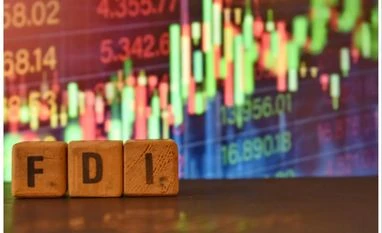India has surpassed the $1 trillion mark in cumulative foreign direct investment (FDI) inflows from April 2000 to September 2024, cementing its position as a global investment hub. According to data from the Department for Promotion of Industry and Internal Trade (DPIIT), this milestone includes $109,219 million in total FDI during the period, with equity investments amounting to Rs 45.96 trillion ($708.65 billion). Over 69 per cent of these inflows were recorded in the last decade (April 2014–September 2024).
In the first half (H1) of FY25, FDI inflows surged by 26 per cent year-on-year to $42.1 billion. The Ministry of Commerce and Industry attributed this growth to FDI’s significant role in providing non-debt financial resources, facilitating technology transfers, and creating employment opportunities.
During the July-September 2024 quarter, total FDI inflows stood at $19.81 billion, with equity inflows contributing $13.61 billion.
Mauritius and Singapore lead FDI inflows
Mauritius emerged as the top source of FDI, accounting for 25 per cent of total inflows. Between April 2000 and September 2024, Mauritius contributed over $177 billion, including $5.34 billion in H1FY25.
Singapore ranked second, accounting for 24 per cent of inflows with $167.5 billion over the same period. Notably, Singapore outpaced Mauritius in H1FY25 with $7.5 billion in investments. The dominance of Mauritius and Singapore is attributed to favourable tax treaties that have streamlined investment flows.
The United States ranked third with 10 per cent of total inflows, followed by the Netherlands (7 per cent), Japan (6 per cent), and the United Kingdom (5 per cent). Smaller contributors, such as the UAE, Germany, and Cyprus, accounted for 2–3 per cent each.
Services sector attracts highest FDI
The services sector, encompassing financial services, IT, and consultancy, led FDI inflows. Between April 2000 and September 2024, the sector received $115.19 billion, representing 16 per cent of India’s total FDI.
However, FDI inflows into the services sector have declined in recent years. In FY23, the sector attracted $8.7 billion, which dropped to $6.64 billion in FY24 and further declined to $5.69 billion by mid-2024.
The computer software and hardware sector followed with $107.08 billion (15 per cent of total inflows). Trading ranked third with $67.96 billion (7 per cent), while telecommunications (6 per cent) and the auto sector (5 per cent) also received significant investments.
Notably, manufacturing witnessed a 69 per cent rise in FDI over the last decade, driven by initiatives like “Make in India” aimed at boosting domestic production and exports.
Investor-friendly reforms
India’s investor-friendly reforms, such as “Make in India,” liberalised sectoral policies, and the introduction of the Goods and Services Tax (GST), have bolstered global investor confidence. Recent measures, including the abolition of the angel tax on startups and reduced corporate tax rates for foreign companies, have further enhanced India’s appeal.
Most sectors allow 100 per cent FDI under the automatic route, requiring only post-investment notification to the Reserve Bank of India (RBI). However, sectors like telecommunications, media, and insurance require government approval.
Prohibited sectors include gambling, lotteries, real estate businesses, and tobacco manufacturing, reflecting India’s focus on strategic and ethical investments.
)